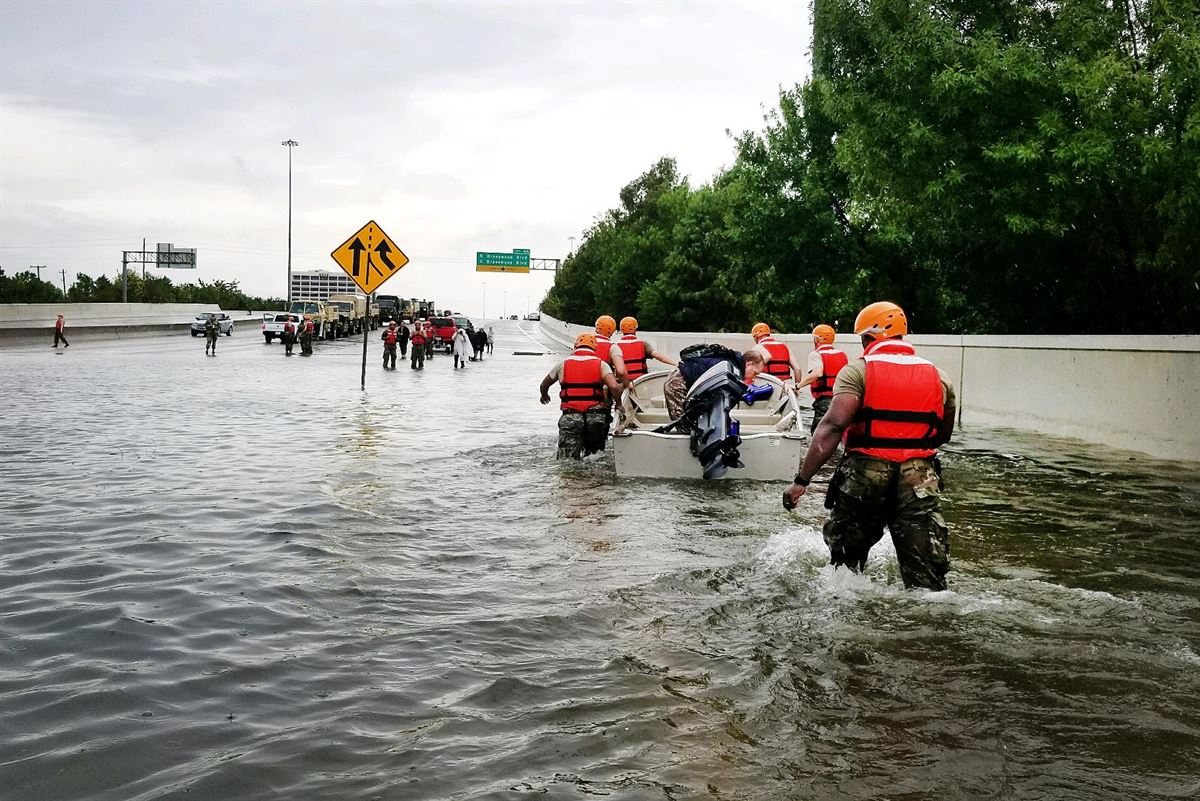Charities and donors are gearing up for what is becoming the largest response to a disaster since at least Hurricane Sandy in 2012 and is likely to be a years-long, billion-dollar recovery effort.
The Center for Disaster Philanthropy (CDP) couldn’t handle the traffic to its donation page from Facebook, crashing the site yesterday. Facebook pledged to match every dollar up to $1 million for the CDP’s Hurricane Harvey Recovery Fund, which was prominently displayed when users logged into Facebook on Tuesday. The effort quickly raised $2 million for the Washington, D.C-based organization that reported revenue of $4.4 million last year.
The CDP will focus on medium- and long-term rebuilding needs and will research unmet needs, vetting local and national nonprofits with the capacity and capabilities to help Texas and Louisiana recover. “We know from past disasters, especially through our experiences with hurricanes and floods, full recovery will likely take many years,” Vice President Regine Webster wrote in a blog post this afternoon. The fund “will support recovery needs long after the TV cameras and news teams roll-up coverage and turn the eye of the world away from this disaster,” she said.
It’s early yet but more than $7.2 million has been raised through the United Way of Greater Houston’s Hurricane Harvey Relief Fund as of yesterday morning. The majority of funds have come from corporations and foundations so far.
The Greater Houston Community Foundation Hurricane Harvey Relief Fund, a joint effort with city government, had raised $2.7 million as of Tuesday. That did not include a $10-million commitment from Houston Rockets owner Leslie Alexander and a $5-million pledge from John Arnold, co-chairman of the Houston-based Laura and John Arnold Foundation.
Thank you Houston’s 1st responders for your tireless work. Laura & I happy to do our part & commit $5 million to relief via @greaterhoucf .
— John Arnold (@JohnArnoldFndtn) August 29, 2017
Million-dollar pledges to assorted agencies, including American Red Cross, were announced by celebrities and sports teams, totaling at least $10 million. Proceeds from the final preseason game for the Houston Texans and Dallas Cowboys had been pledged to the United Way relief fund until the game was canceled this afternoon by the National Football League (NFL). Refunds are available but if they tickets are not refunded, they will go to the relief fund. Money that would have been generated from ticket sales will be matched by a donation from the Texans’ ownership, according to a statement.
Social media combined with technology have made it possible for direct appeals take place and donors respond, in ways that are quite personal, said Una Osili, associate dean for research and international programs at the Lilly Family School of Philanthropy at Indiana University-Purdue University Indianapolis (IUPUI).
Just as text giving became prominent after the 2010 earthquake in Haiti, crowdfunding has taken on a new role in response to Harvey. Many of the crowdfunding platforms were around during Hurricane Sandy in 2012 but they were relatively small and not as widespread, Osili said.
Houston Texans football player J.J. Watt posted a video message on social media directing people to donate to the Houston Flood Relief Fund set up on the free crowdfunding platform YouCaring.com. Within two hours of its creation on Monday, the fund raised $500,000 and Watt has posted a new message, and new goal, periodically. The fund surpassed $6 million from 63,000 supporters this afternoon and Watt reset the goal for $10 million.
UPDATED Sept. 1, 1:30 p.m. Eastern: The crowdfunding effort eclipsed $10 million and is approaching its new goal of $15 million, having raised $14.7 million from almost 142,000 donors.
UPDATED Sept. 5, 9:30 a.m. Eastern: Watt’s crowdfunding campaign is approaching $20 million, at $19.695 million from 182,000 supporters and now indicates on its YouCaring.com page that the Justin J. Watt Foundation is a certified 501(c)(3) nonprofit and provides its tax ID numbers.
It’s unclear what, if any, organization will receive the funds other than Watt declaring it will go directly to the people of Houston. In a video message this afternoon, Watt said the early effort will involve purchasing foods and supplies of all kinds to distribute to people in need.
YouCaring.com, a certified B Corporation, doesn’t take a fee of its own, only the donation processer, such as PayPal or Stripe, takes the usual 2.9 percent fee plus $0.30 per transaction.
“What we’re seeing is innovation in that ability to use multiple channels to reach donors,” she said, adding that each disaster is different. In this case, events are still unfolding and Hurricane Harvey still does not have a clear endpoint as it bears down on Louisiana and water levels have yet to recede after 50 inches of rainfall.
The Lilly Family School of Philanthropy has tracked giving after each disaster since the Sept. 11, 2001 terrorist attacks. This is the first time that crowdfunding is being tracked separately, Osili said.
Initial estimates are generally calculated after the first week. Within a week of the Haiti earthquake in 2010, almost $300 million had been raised, compared with $547 million after Hurricane Katrina in 2005 and $247 million after the Indian Ocean tsunami.
Houston is home to many significant companies beyond the energy sector and corporate giving has taken on a prominent early role in the response. CNN estimated that corporations had pledged at least $65 million to Harvey relief efforts, as of this morning.
“Giving during a disaster is important not just for the company’s good citizenship but also for their employees, many of which may be impacted directly or indirectly, and customers may be in that region,” she said.
“We already know location really does matter when you look at corporate giving,” Osili said. “What we can see so far, the range of companies involved, it’s not just one sector or type of company involved. The problems are so big, one sector can’t solve them.”
Staff Writer Andy Segedin contributed to this report.











